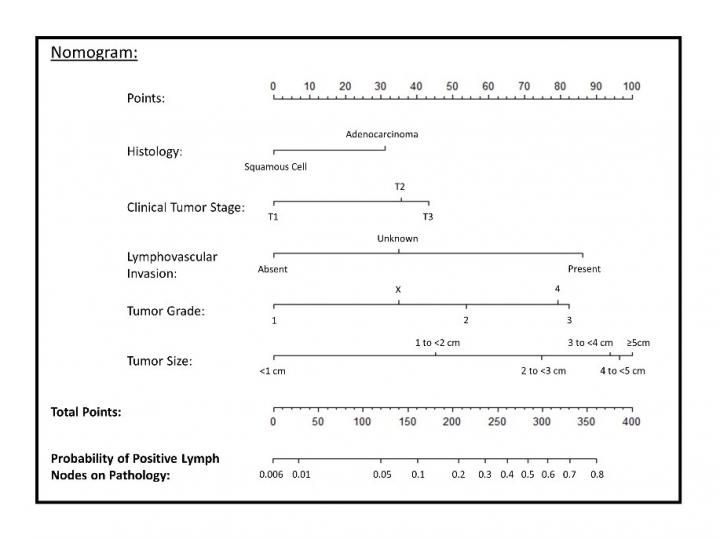Risk-stratification with new nomogram could improve delivery of appropriate therapy to patients with a high risk of nodal metastases

Credit: AATS
TORONTO – May 6, 2019 – Esophageal cancer patients with positive lymph nodes benefit from neoadjuvant therapy prior to surgical resection, but limitations in current clinical staging techniques mean lymph node metastases often go undetected preoperatively. A new nomogram for assessing metastatic risk, unveiled today at the American Association for Thoracic Surgery’s 99th Annual Meeting, shows promise for more accurate risk-stratification, which is particularly relevant for stage T2 patients.
Prior institutional studies have shown rates of occult nodal metastases can be higher than 20% even for presumed early stage disease, indicating that current staging practices alone may not be adequate for appropriately risk-stratifying patients preoperatively. With new methods for identifying risk, clinicians can undertake more informed treatment discussions with patients.
The research team used the National Cancer Database, analyzing more than 3000 patients. Using readily available clinical variables, the nomogram is able to predict the likelihood of occult lymph node metastases in surgically resectable esophageal cancers.
Lead author, Tara Semenkovich, MD MPHS of the Division of Cardiothoracic Surgery at Washington University in St. Louis, explained, “Because of the inaccuracies in clinical staging, our goal was to provide an additional resource to help identify patients who would be most likely to benefit from neoadjuvant therapy. The hope is that providers can improve the delivery of appropriate care to patients based on their risk of nodal disease.”
###
Notes for Editors:
A Clinical Nomogram for Predicting Node Positive Disease in Esophageal Cancer
Tara R. Semenkovich, Melanie Subramanian, Bryan F. Meyers, Benjamin D. Kozower, Ruben Nava, G. Alexander Patterson, Daniel Kreisel, Varun Puri, Washington University in St. Louis, Saint Louis, MO
Presented by Tara Semenkovich, MD, Monday May 6, 2019 at the AATS 99th Annual Meeting.
ABOUT THE AMERICAN ASSOCIATION FOR THORACIC SURGERY (AATS)
The American Association for Thoracic Surgery (AATS) is an international organization that encourages, promotes, and stimulates the scientific investigation of cardiothoracic surgery. Founded in 1917 by a respected group of the earliest pioneers in the field, its original mission was to “foster the evolution of an interest in surgery of the Thorax.” Today, the AATS is the premiere association for cardiothoracic surgeons in the world and works to continually enhance the ability of cardiothoracic surgeons to provide the highest quality of patient care. Its more than 1500 members have a proven record of distinction within the specialty and have made significant contributions to the care and treatment of cardiothoracic disease. Visit http://www.
Media Contact
Alexis Merry
[email protected]




